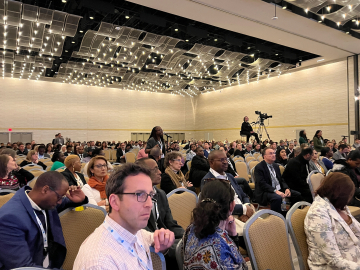7 Pro Tips for Building Healthy Conversations on Social
Whether you’re an educator trying to reach young people on touchy topics, a doctor determined to fight fake news with facts, or a communicator promoting public health or doing damage control for your organization, you need to know your way around social media.
Several social media pros shared some of their secrets—many learned the hard way—in a Facebook Live webinar Friday, hosted by 120 Under 40 of the Bill & Melinda Gates Institute for Population and Reproductive Health at the Johns Hopkins Bloomberg School of Public Health, which emphasizes the “positive disruptions” made by young leaders in family planning.
We’ve pulled out 7 tips from the pros, introduced by Gus Sentementes, audience engagement manager at Johns Hopkins University.
- The plus side of YouTube: It’s highly accessible, multi-cultural, and a huge platform in many countries outside the US, explained Laci Green, a sex educator and YouTube video blogger—and broader perspectives strengthen your work and community. On the down side, she cautions, short 4-minute videos on YouTube or 140-character Tweets are not necessarily suited for tough topics.
- Another secret: Pay attention to emerging platforms, Green said. Being on YouTube from the beginning really paid off for her in terms of developing an audience.
- Steer clear of medical jargon, said Tlaleng Mofokeng, MBChB, deputy chair of the Sexual and Reproductive Justice Coalition of South Africa. As a doctor providing information about sensitive topics surrounding sexuality and consent in South Africa, she also doesn't shy away from using essential sexual terminology to give young people the language they need.
- Develop a response strategy now, warns Christy Feig, senior vice president of Global Health Strategies—not when the mistakes happen (and they inevitably will).
- Once those inevitable mistakes happen, it’s all about how you respond. Whether it’s incorrect information posted about an Ebola outbreak or an errant message from a personal account that makes its way onto a professional Facebook page, Feig says you need to decide whether to respond. Is it likely to go viral? If so, she says, respond quickly—and try to sound human.
- Create a mission statement that grounds you, advised Marisa Russell, a social media specialist at the Bloomberg School. In times of crisis, she said, you can look back, reflect and re-ground yourself.
- Determine your audience, find them where they are, and meet them there, Russell also suggested. (Newsflash: If you’re looking for young people, she advises, Facebook may be past prime).
For more social media wisdom, including detailed real-life examples, when (and whether) to delete a bad Tweet, and how (and whether) to respond to trolls, and more, head over to 120 Under 40’s Facebook page to watch the whole session.
iStock





